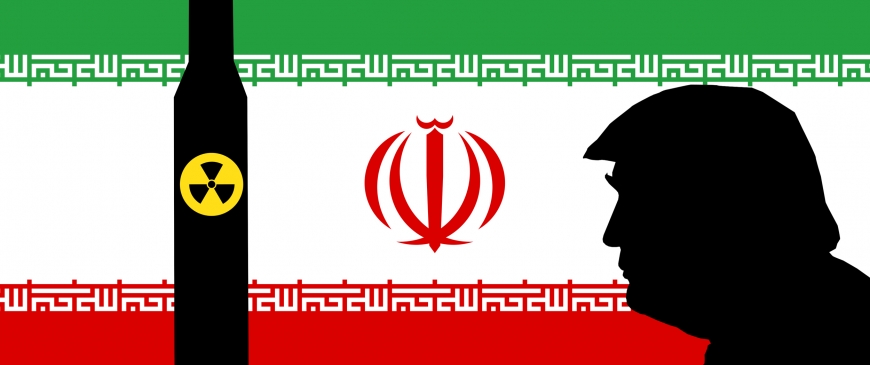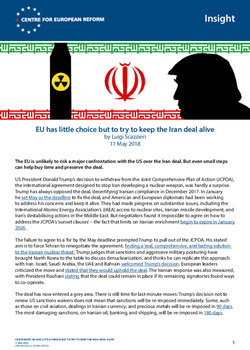
EU has little choice but to try to keep the Iran deal alive
The EU is unlikely to risk a major confrontation with the US over the Iran deal. But even small steps can help buy time and preserve the deal.
US President Donald Trump’s decision to withdraw from the Joint Comprehensive Plan of Action (JCPOA), the international agreement designed to stop Iran developing a nuclear weapon, was hardly a surprise. Trump has always opposed the deal, ‘decertifying’ Iranian compliance in December 2017. In January he set May as the deadline to fix the deal, and American and European diplomats had been working to address his concerns and keep it alive. They had made progress on substantive issues, including the International Atomic Energy Association’s (IAEA) access to nuclear sites, Iranian missile development, and Iran’s destabilising actions in the Middle East. But negotiators found it impossible to agree on how to address the JCPOA’s ‘sunset clauses’ – the fact that limits on Iranian enrichment begin to expire in January 2026.
The failure to agree to a ‘fix’ by the May deadline prompted Trump to pull out of the JCPOA. His stated aim is to force Tehran to renegotiate the agreement, finding a ‘real, comprehensive, and lasting solution to the Iranian nuclear threat’. Trump judges that sanctions and aggressive military posturing have brought North Korea to the table to discuss denuclearisation, and thinks he can replicate this approach with Iran. Israel, Saudi Arabia, the UAE and Bahrain welcomed Trump’s decision. European leaders criticized the move and stated that they would uphold the deal. The Iranian response was also measured, with President Rouhani stating that the deal could remain in place if its remaining signatories found ways to co-operate.
Trump judges that sanctions and aggressive military posturing have brought North Korea to the table, and thinks he can replicate this approach with Iran.
The deal has now entered a grey area. There is still time for last-minute moves: Trump’s decision not to renew US sanctions waivers does not mean that sanctions will be re-imposed immediately. Some, such as those on civil aviation, dealings in Iranian currency, and precious metals will be re-imposed in 90 days. The most damaging sanctions, on Iranian oil, banking, and shipping, will be re-imposed in 180 days.
In the short term, both the EU and Iran will seek to preserve the deal, even without the US. For now, Iran is unlikely to violate the JCPOA by resuming enrichment. Doing so would cast it as a spoiler and reduce international goodwill, putting pressure on the EU, China and Russia to re-impose sanctions alongside the US. However, after Trump’s decision, the long-term prospects for the JCPOA are poor. The problem for the EU is that the main incentives for Iran to comply with the JCPOA (apart from fear of US military action) are economic. Trump’s decision calls the economic benefits of the deal into question: by threatening measures against all companies that do business with Iran, the US aims to squeeze the Iranian economy. Trump thinks he can hit Iran hard, as its economy already appears highly vulnerable, with its currency at historic lows against the US dollar.
If it wants to keep the deal alive, the EU will need to reduce the impact of US sanctions on its trade with Iran. As an initial step, European governments are offering legal advice to companies and seeking exemptions from US sanctions in the hope that they can continue to do business with Iran, although they are highly unlikely to obtain them. The EU could also attempt to revive its ‘blocking statute’. Introduced in 1996, following the adoption of new US sanctions on Cuba, the statute prohibits EU-based companies from complying with certain US extraterritorial sanctions. The EU could also set up credit lines for businesses to make it easier to make payments in Iran, without going through the international payments system, as Italy has done. However, these steps will not be enough to mitigate the impact of US sanctions. The EU’s blocking statute did not stop European companies following US law: firms were more fearful of US sanctions than of the statute. Likewise, if businesses have to choose between the US and the Iranian market, only companies that do limited business in the US are likely to choose Iran.
There is still time for last-minute moves: Trump’s decision not to renew US sanctions waivers does not mean that sanctions will be re-imposed immediately.
In theory, the EU could take more ambitious steps to curtail the impact of US sanctions. For example, the EU could offer trade liberalisation to Iran, a step that the US would see as rewarding Iran despite its destabilising regional foreign policy. The EU could also agree to indemnify European businesses for the costs of US sanctions, and offer euro denominated loans to Iran through the European Investment Bank. Finally, the EU could also threaten to retaliate against US sanctions imposed on European companies by sanctioning US companies in Europe. However, all of these steps would lead to a sharp rupture in transatlantic relations, and it seems doubtful the EU will have the appetite to implement them. If he thinks that the EU is sabotaging US policy and helping Iran, Trump is highly likely to immediately impose the so-far delayed steel and aluminium tariffs, and to hit European firms with sanctions.
This would start a tit-for-tat escalation, which would not be limited to trade. Trump makes linkages between issues where another administration would not, and uses any leverage he can. It is even possible to imagine Trump calling into question the US commitment to NATO on the basis that Europeans were helping America’s enemies. And in such a context, with so many member-states heavily dependent on the US for security, European solidarity would probably not last long. European leaders may state that they can no longer rely on the US, and that the EU should be ready to ‘take its destiny into its own hands’, but so far they have shown little inclination to make the investments that would allow them to translate that ambition into reality.
If he thinks that the EU is sabotaging US policy and helping Iran, Trump is highly likely to immediately impose the so-far delayed steel and aluminium tariffs, and to hit European firms with sanctions.
Mindful of the risks inherent in starting a trade war with the US, the EU will probably not be able to provide Tehran with extensive support. The risk is that the JCPOA will unravel over time as business dries up and the Iranian economy suffers. Hardliners in Tehran will be strengthened, and Iran will become increasingly tempted to restart its nuclear weapons programme, for example stepping up research and development, resuming enrichment and making it more difficult for IAEA officials to carry out inspections. Discovery of a covert programme would be likely to trigger either US or Israeli military strikes on nuclear facilities. But even without direct military conflict with the US or Israel, Iran’s destabilising regional policy is unlikely to change simply because of US sanctions. In fact, through its local proxies, Tehran is likely to step up its confrontations with the US, Saudi Arabia and Israel, increasing the risk of more regional instability and conflict.
The EU should try to stop such scenarios unfolding before they start. There is a strong case for buying time, as Trump may not be re-elected in 2020. The EU can take steps to preserve the deal while keeping confrontation with the US below the critical threshold of tit-for-tat sanctions. The EU will also need to signal to Tehran its commitment to the deal while communicating that violations of the agreement will result in the re-imposition of EU sanctions. To mitigate the impact of US sanctions, the EU should open credit lines to make it easy for those European companies who have only limited links to the US to do business with Iran if they are prepared to take the risk.
The EU will also have to continue the diplomatic efforts of the past few months, trying to iron out the contentious elements of the JCPOA with Iran and the US. Repairing the deal may not be possible in the short term. But the EU has little choice but to try to salvage something from the wreckage: Tehran may calculate that it has survived sanctions before and can survive them again; but it probably under-estimates the risk that Trump could respond militarily to any perceived Iranian provocation. The EU has every incentive to try to persuade Iran to abide by the JCPOA and refrain from making a bad situation in the region worse.
Luigi Scazzieri is a research fellow at the Centre for European Reform.


Comments
Add new comment